© Edm
There is no shortage of ghost stories about ships and the sea, but Vladimir Putin has launched a whole ghost fleet. There’s nothing spooky about it, though, just worrying.
When you hear tales of ghost fleets you somehow expect skeletal hands on the ship’s wheel and a red-eyed skull glaring from the haunted bridge. No such luck. Where Vladimir Putin, Russia’s acquisitive president is concerned, this is not so much a case of skulls and cutlasses as skulls and cross-bones. After all, Putin is more of a pirate than an “unquiet spirit”. Please pass that flask of rum, somebody. Or perhaps it should be vodka, which is generally more to Russian tastes than rum. He may haunt the corridors of the Kremlin but only in strictly corporal form. He can certainly be unearthly and frightening, but he is never-the-less human, it seems, however much his actions and statements may suggest otherwise. Now he stands accused of launching a whole “ghost fleet” (as various politicians and sections of the media have named it) of ageing vessels to ship Russia’s crude oil to potential customers, in violation of various bans, price caps and restrictions. In his case, of course, we should expect nothing else.
It’s been referred to as a “shadow fleet”, whose mariners know very well that they’re engaged in sanctions-busting. It has also been called a “ghost fleet”, despite the obvious lack of anything spiritual or spooky about it. It’s not merely a case of shipping oil to places where it’s not supposed to go for profit. These “ghost ships” have also been dragging their anchors over the bed of the Baltic Sea between Finland and Estonia in order to snag the undersea cables that provide power and communications. Police in Finland have detained indefinitely the crew of a Russia-linked tanker, the Eagle S, which is accused of deliberately damaging a power cable. Finnish police arrested the entire crew of twenty-four, restricting the movements of the eight people being held most responsible, while they investigate who was behind the move. Finnish police are especially keen to establish who exactly plotted the vessel’s route. The investigation is likely to take some time to reach its conclusions, during which the eight chief suspects will remain in custody, even though, unlike the poet Samuel Taylor Coleridge’s Ancient Mariner, they never shot an albatross.
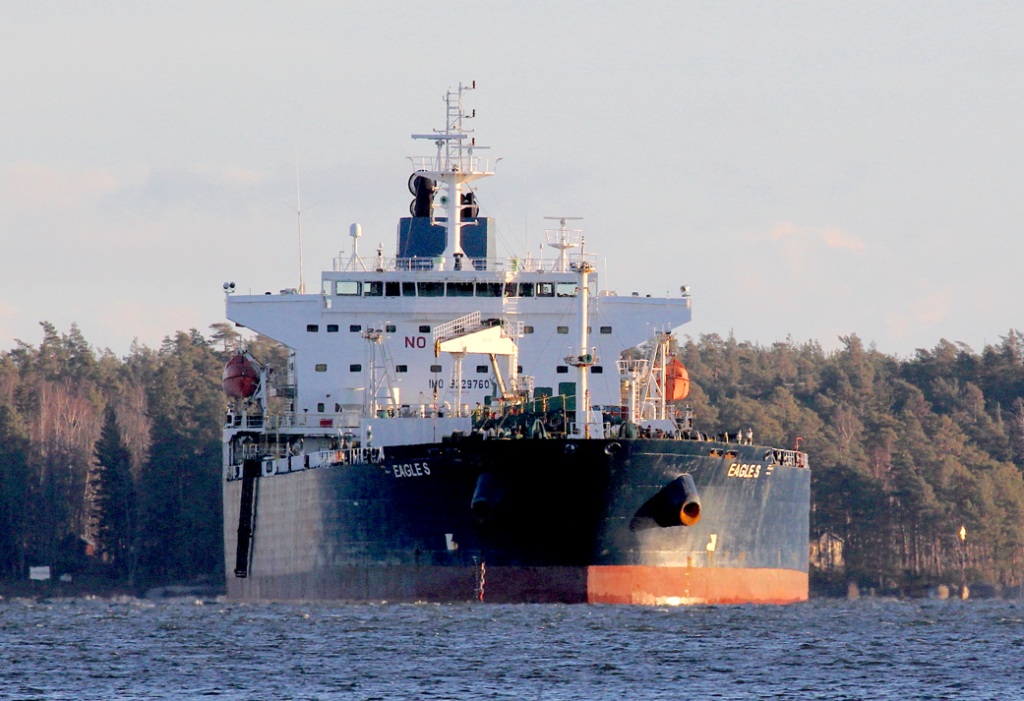
The numbers of those under investigation may change, however, as the inquiries and hearings progress.
Another worrying aspect of this whole affair – apart from the sanctions-busting by Russia – is the use of very old and often poorly maintained tankers whose sea-worthiness has been questioned. In most cases they are not insured, either. They are not thought sufficiently important by Russia to waste the money it would cost to insure them. If they sink, it seems, they simply sink; “goodbye, sailors!”. Ursula von der Leyen, the President of the European Commission has stressed the importance of maintaining pressure on Moscow, despite the insistence by Hungary (itself an EU member state, even if its actions display a disregard for the rules) on maintaining its close links with Russia. The current sanctions are part of the so-called “15th Package” since Russia launched its invasion of Ukraine in 2022. Under it, Western companies – meaning members of the EU or G7 – are prohibited from providing services like insurance, financing and allowing the flying of national flags to any fleet seeking to sell oil at prices above those agreed by the West. It would seem that Vladimir Putin’s “ghost fleet” in no way resembles the famed Mary Celeste, found afloat off the Azores but minus crew and passengers in 1872. The most accepted version of the story is that the captain of that famous vessel believed (erroneously) that she was sinking and ordered everyone to abandon ship. A less well-known fact is that the Mary Celeste continued to be used as a cargo vessel long after she was found abandoned, indeed until 1885, when its captain sailed it into a reef deliberately as part of an insurance scam. It failed to sink, however, and its wreck eventually simply rotted away. In various works of fiction about the mystery, the ship became accidentally renamed the Marie Celeste, although she was really the Mary Celeste, despite having been launched originally in 1861 as the Amazon, and was only renamed the Mary Celeste seven years later.
| SPECTRE OR SPECTACLE?
In other words, there’s not much of a mystery about the Mary Celeste. Her final demise in an attempted insurance fraud seems to fit with the stories told since, including those concerning Putin’s “ghost fleet”, which has no link to ghosts whatever.
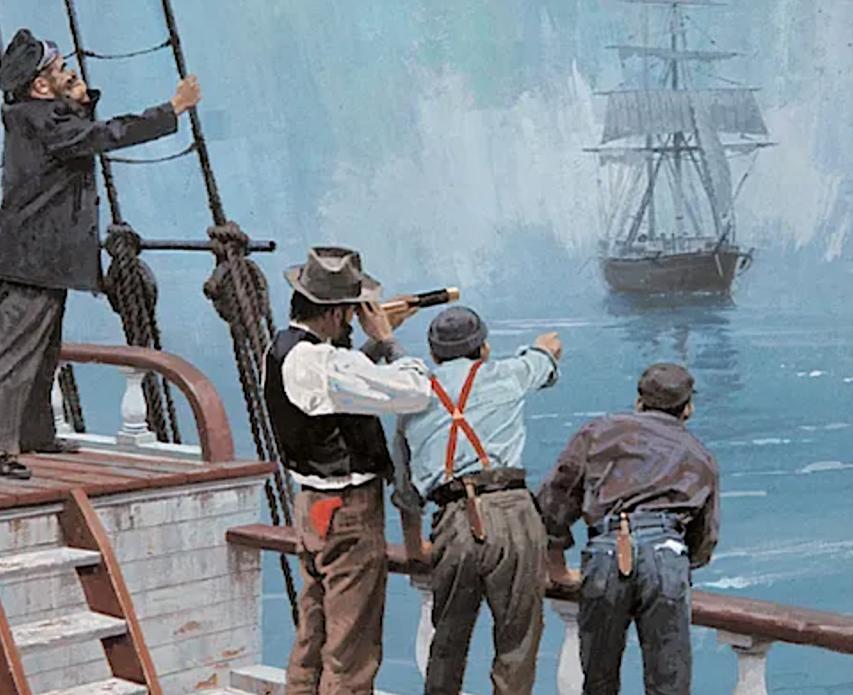
There’s nothing intrinsically spooky about smuggling or breaking shipment restrictions simply to make more money. It has a strong resemblance to the smuggling voyages of old, but no ghosts were involved. According to the Carnegie Politika publication, it’s all fairly simple (and free of ghosts). It was towards the end of 2022 that supporters of Ukraine set a price cap for exports of Russian crude oil, with further rules supposedly to prevent Russia from chartering or insuring tankers to serve its needs. Needless to say, Moscow was not happy with this, so it decided to defy the rules by sourcing tankers and other maritime services elsewhere. The tankers employed in this clandestine series of operations are manned by crews that know they’re breaking the rules but don’t care (or have no choice), so they continue to operate, fully aware that they are doing so in defiance of Western sanctions. It’s generally assumed that most if not quite all of the Russian oil they carry is being sold outside of the price cap regime, even if the owners and insurers are well aware that they’re breaking international rules. They’re not making friends in the West that way but they’re certainly making money, which clearly matters more to them.
It may not prove quite as easy as they hope: Western naval nations have pledged to keep checks on the ageing tankers serving Putin’s need. EU authorities will demand the paperwork covering tankers that could potentially pose a threat to the environment. The Prime Minister of Estonia, Kristen Michal, has promised action since the EU imposed fresh sanctions on some fifty vessels that Moscow is believed to be using to evade Western price limits on crude oil exports. Six countries – Denmark, the UK, Sweden, Finland, Poland and Estonia have said that from now on they will ask suspected “shadow fleet” vessels for paperwork, including proof that they are covered by insurance when sailing through sensitive stretches of water such as the English Channel and the Danish Strait, according to Ms. Michal. If any vessels fail to cooperate, their details will be passed on for possible further action.

There is a clear determination to disrupt Putin’s military aims. Western allies want to ensure that Russia faces the greatest possible difficulties in funding his war machine through using vessels that fly flags of convenience and switching off the transponders, leaving them virtually invisible. They have also been actively disguising the origins of their cargoes in order to conceal their actual trading links with Russia. It matters far beyond the money-grubbing of Putin: when two vessels from Russia were damaged in a storm in the Kerch Strait, it led to some 3,700 tonnes of crude oil being spilled, some of it washing up along the Russian coast, although Putin seems not to care.
Oil may have originated from ancient plant and animal life, but it poses a great risk to the environment now in its fossilised state. It can coat the wings of birds, leaving those affected unable to fly, and it can strip away the insulating properties of, for instance, a sea otter’s fur, greatly reducing its chances of survival. That’s not all: oil is made up of a lot of harmful chemical compounds that threaten the health of marine creatures. These chemicals can cause all sorts of damage, harming the heart, stunting physical growth, undermining the natural benefits of the immune system and even causing death directly. There have been quite a few instances of such deadly damage being caused, with the Deepwater Horizon providing plentiful examples of the damage that can be caused. Just in case you’ve forgotten the details, Deepwater Horizon was a semi-submersible offshore drilling rig owned by Transocean and operated by the BP oil company. On 20 April 2010, while drilling in the Gulf of Mexico at the Macondo Prospect, there was an unexpected blowout which caused an explosion on the rig. It killed 11 crewmen outright and ignited a fireball that was visible from 40 miles away.
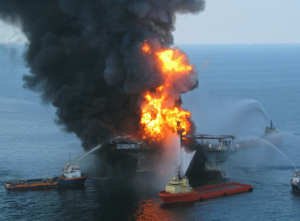
It is impossible to clear up all of the oil spilled in a rig accident by using high pressure hoses and hot water, as happened in the case of the Exon Valdez. That did even more damage than the pollution itself. The whole operation is invariably hugely expensive, and if the vessel involved is not insured there’s virtually no chance of recovering the cost. Putin is on a winner with his total disregard for anything apart from his wealth and profit (and, one assumes, power). As it is, oil spills harm sea creatures, they can ruin a day at the beach for holidaymakers and make seafood unsafe to eat, even poisonous. It could take years for the ocean environment to recover, however well the clean-up was done. With Russia deliberately using old and often uninsured vessels in poor condition, there is a genuine fear of widespread damage being caused.
Bypassing the rules to make illegal exports easier is one thing, but Russia goes much further. It’s not the first country to have disregarded its responsibilities in keeping wildlife alive. Take the dodo, for instance, made famous by Lewis Carroll in his children’s book, “Alice’s Adventures in Wonderland”, first published in 1865. The dodo was a flightless pigeon, up to one metre tall, with grey-brown plumage and, it seems, an unpleasant flavour, although that didn’t stop sailors from eating them. According to the English traveller Sir Thomas Herbert, writing after he had tasted some in 1634, “to the delicate they are offensive and of no nourishment.” Hardly much of a recommendation, although much the same could be said today about burgers and pizzas in my opinion. In English we have a saying for something that has died out completely. We say: “it’s as dead as a dodo”, and I suppose we British should know, since we killed them. We humans certainly didn’t mess about, however: the bird was first reported in 1598 and by 1662 it was extinct. Wow! Killed off in just 64 years. The birds were inquisitive and never learned to run away from humans.

Nowadays, the damage to the environment is mainly (it’s thought) accidental but certainly just as deadly. Russian agents have disrupted train travel across mainland Europe, as well as damaging other infrastructure, ironically preventing attendances at a conference specifically about how to deter this exact sort of terrorist attack, for example. The indications are, however, that Putin would not have worried too much about the disappearance of the dodo. Germany and other European nations are getting used to acts of malicious sabotage and have mainly laid the blame squarely at Russia’s door. It has led to cases of Western leaders softening their support for Ukraine to deter Russia’s acts of sabotage, although with so many kilometres of vulnerable infrastructure, catching the perpetrators “in the act” has so far proved impossible. It is known, however, that Russia employs the skills of such organisations as the Kremlin’s “Main Directorate for Deep Sea Research”, not to mention the Russian navy and the GRU intelligence units to scout out vulnerable spots to attack and cause maximum disruption. Putin has, for a long time, conducted what are called “Grey Zone” operations that include cyberattacks, cuts in energy supplies and disinformation campaigns. Moscow makes no secret of its activities, either: Russia’s ambassador to the UK has stated publicly that Britain’s support for Ukraine, however tentative, makes it “a participant in Russia’s war” and therefore a potential target for hostile acts. Kremlin officials have made similar comments concerning the United States.
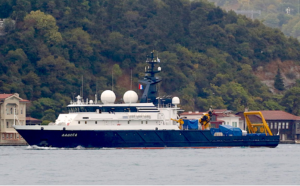
It presents the world with a deniable but highly dangerous war, in which there is only one single belligerent, at least officially. Who needs an obvious military enemy when secret agents can attack another country with virtual impunity? Some experts have expressed surprise that Western powers have still not invoked the Article 4 consultative mechanism of NATO’s founding treaty among NATO member states. Just to remind you, under the Article 4 I have mentioned, member states can raise any issue of concern, especially related to the security of a member country, for discussion with fellow member states within the North Atlantic Council. Since the Alliance’s creation in 1949, Article 4 has been invoked seven times. It may be part of NATO’s “escalation management” strategy, but many think that’s now misguided. Trying to prevent it becoming a full-scale war is one thing, but Western countries are getting bolder, with the Czech Prime Minister Petr Fiala openly blaming Russia for a big arson attack on a Prague bus depot, a attack he linked to similar incidents in Poland and Lithuania. A South American was arrested over those incidents, but it seems likely they were organised and financed from Moscow. The UK has also blamed Russia for an act of arson that caused a fire at a warehouse storing goods intended for Ukraine. At least in this case one can see what Putin was trying to achieve, even if it doesn’t get him any invitations to prestigious events. He never was trying to be Mr. popular, after all.
| STILL GOING BANG
It does worry the Western countries, of course, understandably. In 2024, EU countries spent 1.6% of their GDP on defence. Now leaders are mainly in agreement that this figure must increase; Russia is a dangerous and unpredictable foe. The talk is of increasing the percentage earmarked for defence to 2% or even 3% of GDP.

That is a major increase, considering that Europe generally outsources its defence to the United States. Under a Donald Trump presidency that may not be quite so sure. Trump is on record as having praised Putin and he has also said that he expects European countries to raise their defence spending to 5% of GDP if they expect the United States to provide them with protection. That means that that the EU countries may need to increase their spending on defence to around €100-billion, forcing the Union to cut other areas of spending, according to Andrius Kubilius, the EU’s first-ever Defence Commissioner. It will mean changes; the current EU defence budget stands at a mere €8-billion. There will be wider implications, too. Some EU countries that are especially keen to keep on the right side of the United States, such as the Baltic states, may reject the idea of retaliatory tariffs against Trump, as well as siding with the US on any measures against China, for instance, according to The Economist.

EU member states are not exactly rolling in unspent spare cash, either: public debt in France, Italy and Spain is above 100% of GDP and in 2023 France ran a deficit of more than 6% of GDP. Paris hopes to bring that down to 5% during 2025, a seemingly modest ambition but it will never-the-less be an uphill struggle. Again, according to The Economist, France will need to make spending cuts or tax rises that amount to 4% of GDP. The magazine says things would be tough for Poland and Italy, too. The EU changed its own fiscal rules in April 2024, now demanding that each member state puts plans in place for a better-balanced budget, either through lower public spending or higher taxes. The European Central Bank (ECB) insists that compliance with its new rules must be mandatory for any country that hopes to gain its support. Expect tough times ahead and a lot of bitter arguments.
Meanwhile, the US Treasury is taking decisive action against Russia’s sanction evasion schemes. The prime target is a financial institution based in Kyrgyzstan that has effectively been laundering payments on Putin’s behalf. This particular act of dishonesty has provided links between actors in Russia and the People’s Republic of China to facilitate cross-border payments between the two countries. Like most financial institutions, the ECB is still battling with inflation, with the costs of services proving to be an especially tricky problem, standing 4% higher than they were a year previously. According to the World Bank Group’s 2023 figures, services in the EU accounted for 65% of GDP overall, although figures vary widely across member states. It’s harder to read the figures for Russia because the government there has now declared the Moscow Times to be a hostile foreign organ because it sometimes questions the brilliance of Putin’s decisions. It’s no longer a newspaper, merely a propaganda sheet for Putin and his cronies. According to Moscow sources, it sometimes “discredits the decisions of the Russian leadership”. Perhaps somebody should explain to Putin that questioning government decisions is what newspapers are supposed to do? But in Russia, it seems, nobody must ever question Putin’s brilliance. If he says or does something it can only be right, even if that sounds like paranoia to those of us on the outside.
It’s not all bad news for Putin. Turkish President Recep Tayyip Erdogan has told him in a telephone call that he wants to expand trade between Ankara and Moscow. He took the opportunity to condemn Russia’s invasion of Ukraine but also assured Putin of Turkey’s continuing “neutral stance” on the war itself.
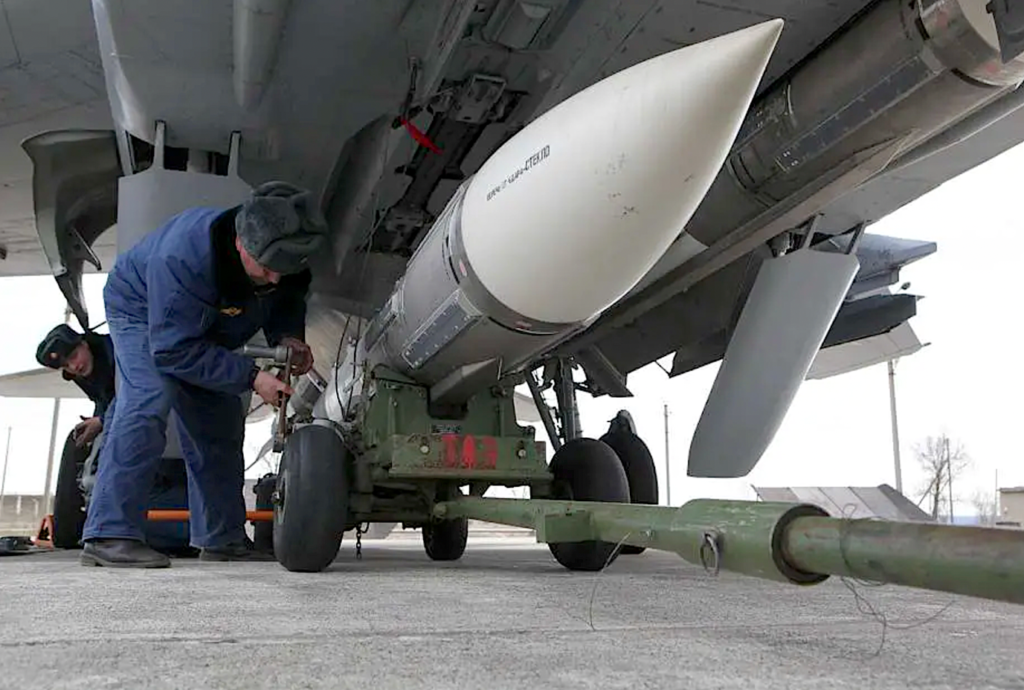
Meanwhile, Russia continues to target Ukraine with missiles, including a new Oreshnik hypersonic intermediate-range missile (IRBM), fragments of which were shown to journalists by Ukraine at an undisclosed location. Ukraine admitted it was not a type of missile they had encountered before. It comes as no huge surprise, of course, but Ukraine is understandably worried when a new type of missile is used. Putin boasted that the new missile is exceptionally fast and that it can evade air defences. Kyiv’s unsurprising response was to appeal for updated air defence systems with which to ward off these new attacks. Ukraine continues to fire US-made ATACMS missiles and British-made Storm Shadow missiles into Russia. Putin has said he will continue to test-fire Oreshnik missiles at Ukrainian facilities, which will come as no surprise to anyone The most recent such attacks were described by Ukrainian President Volodymyr Zelensky as “the latest bout of Russian madness”. A war of words is hardly surprising but the use of more deadly forms of attack gives rise to concern, of course.
And just in case Putin might question the level of support Zelensky is getting from the West, Kyiv has now seen its first-ever visit by Britain’s (fairly) new Prime Minister, Sir Kier Starmer, during which he- pledged to put Ukraine in its “strongest possible” position vis-à-vis Russia, pledging that the UK will “never let up” in supporting Ukraine, signing what the Prime Minister’s office described as a “landmark 100-year partnership. Zelensky described it as a “truly historic day”, leaving Ukraine with a partnership that is “closer than ever”. The agreement formalises economic and military support already pledged to the country. It was clearly signed just before Trump assumed the Presidency of the United States, making is very significant. It should serve to encourage other Western nations sympathetic to Ukraine and not fond of Putin’s Russia.
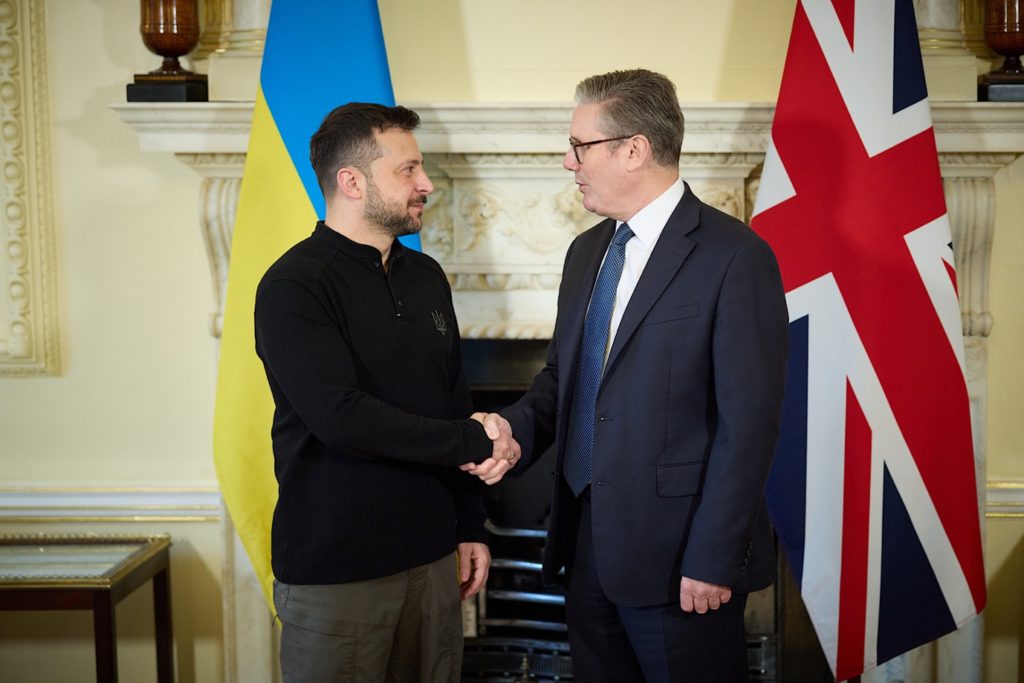
Meanwhile, of course, Putin’s much-vaunted “ghost fleet” sails on, without a spook in sight. As that old rhyme says: “From ghoulies and ghosties and long-leggedy beasties, and things that go ‘bump’ in the night, Good Lord deliver us.” Delivering us from things that go “bang” in the night is generally more of a challenge (especially if it’s a very loud ‘bang’ with a wide blast radius), but the Ukrainians are discovering that a religious exorcism doesn’t work, not in Putin’s case. Using a chalice and a bowl of “holy water” won’t get rid of him. This seems to be a horror story without an identifiable spook, just a self-obsessed man whose behaviour to those of us outside Russia seems extremely irrational. In some ways, a ghost might be preferable. Perhaps it ought to be the ghost of a dodo? After all, we know they’re all dead now. We killed them.
Jim.Gibbons@europe-diplomatic.eu

